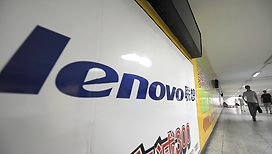
One slips on so-so earnings – only $7bn in quarterly profits. The other jumps 3 per cent on a deal that will hurt its bottom line. It isn’t hard to see that the latter, Lenovo, has more market momentum than Samsung Electronics. Both make consumer electronics and tech hardware, from Lenovo’s new server business to Samsung’s chips. Might Lenovo become the next Samsung?
一只股票因企业盈利表现一般而下滑——季度利润只有70亿美元。另一只股票则因一笔将会损害公司利润的交易而上涨3%。不难看出,后者——联想(Lenovo)比三星电子(Samsung Electronics)的市场势头更强劲。从联想的新服务器业务,到三星的芯片业务,两家公司都生产消费者电子产品和科技硬件。联想会成为下一个三星吗?
On a size basis, the comparison is still a bit ridiculous. Samsung’s market capitalisation is $160bn; Lenovo’s, $14bn. Samsung’s profits last quarter were 10 times Lenovo’s for the past year. Still, Lenovo’s deal this week to buy IBM’s X86 server business demonstrates that it still has the ambition it showed when it bought Big Blue’s PC business in 2004.
从规模上看,这样的比较仍有些可笑。三星的市值是1600亿美元;联想则是140亿美元。三星在最近一个季度的利润是联想过去一年利润的10倍。不过,联想近日收购IBM x86服务器业务的交易表明,它仍具备其2004年收购“蓝色巨人”个人电脑业务时所展现的雄心壮志。
The relatively low price paid – half of sales – reflects the IBM unit’s swing into loss last year. The business will knock about 5 per cent off Lenovo’s full-year earnings per share, including the slight dilution from the shares issued to IBM. The shares’ rise suggests that investors think it can use its lower cost structure to lift profits.
相对低廉的收购价格(相当于销售额的一半),反映了IBM该项业务去年陷入亏损。该业务将令联想的全年每股盈利削减5%,包括向IBM发行股票后造成的轻微稀释。股价上涨表明,投资者认为联想能以相对较低的成本结构来提高利润。
Investors like bold tech stories. Samsung’s success was not born of timidity either. It has never bought in growth as Lenovo has, but has taken risks to move up the value chain. One of the reasons for its unexpectedly poor earnings in the latest quarter was a Won800bn ($738m) bonus paid to employees to mark the 20th anniversary of a strategy. Back then its chairman made a bonfire of 150,000 mobile phones – worth $50m – to make the point he wanted better. Now Samsung is trying to push into software – a challenge for a company staffed by hardware engineers.
投资者喜欢大胆的科技企业故事。三星的成功也并非来自怯懦。它从没有像联想那样通过收购来实现增长,但它曾冒风险向价值链上游转移。三星在最近一个季度意料之外的利润下滑,其中一个原因是它向员工支付了8000亿韩元(合7.38亿美元)的奖金,以庆祝其20年前实施的一项战略。当时三星主席将15万部手机(总值5000万美元)付之一炬,以此表达他期望打造更好产品的决心。现在三星正试图打入软件领域——对一家由硬件工程师组成的公司来说是个挑战。
Samsung’s shares have risen 20 per cent a year, compounded, for the past two decades. Should Lenovo follow suit, it will take it a little over a decade to reach Samsung’s present size.
过去20年里,三星股价年均复合上涨20%。联想若能实现同样的成就,它将需要10年多一点的时间达到三星目前的规模。
Lenovo has momentum on its side. But can it sustain profit growth on a foundation of low-cost manufacture of commodity hardware? Samsung invested aggressively to acquire an enduring competitive advantage – scale – in chips, and from there built a hugely profitable premium phone business. Lenovo needs to find a similar edge.
势头对联想有利,但它能否以低成本制造平价商品化的硬件为基础,维持利润增长?三星通过大举投资,获得了芯片领域的持久竞争优势——规模,在此基础上建立了一个利润丰厚的高端手机业务。联想需要找到类似的竞争优势。













